
For Francisco Chávez and Gaspar Cobo, it’s still painful to realize that they’re no longer home in the Cuchumatanes mountains of Quiché, Guatemala. Now they’re in El Paso, Texas, where they await their asylum hearingsa process that’s been marked by the cruel realities of the hostile U.S. immigration system. Even though U.S. intervention in Central America triggered many of the conditions that forced Chávez and Cobo to flee in 2019, there’s no guarantee they’ll be given permanent refuge here. But they’re fighting.
State persecution and violence have been present in the lives of Chávez, 45, and Cobo, 32, since before they were even born. The Maya Ixil leaders are part of a multigenerational resistance against omnipresent colonial and imperialist forces, which for centuries have triggered the displacement of their communities and the destruction and exploitation of sacred land and natural resources.
Cobo is a longtime Indigenous rights advocate and land and water defender who was forced to flee after a man threatened his life in May 2019. His friend Chávez decided to join him. Chávez is a survivor of a 1982 massacre perpetrated in the Ixil region by U.S.-backed Guatemalan military officers, and he was a key witnesses in the 2013 genocide trial against former dictator General Efraín Ríos Montt. Chávez had already contemplated trekking north after getting several death threats over his advocacy on behalf of survivors of the Indigenous genocide. He repeatedly filed complaints with the public prosecutor’s office and the police, but nothing was ever done. The pair left Guatemala in June 2019 and arrived in the U.S.-Mexico border two weeks later. The previous year alone, at least 26 human rights advocates and Indigenous leaders were assassinated in Guatemala, including one of Cobo’s friends, a 20-year-old university student.
For much of their lives, Cobo and Chávez, whose Ixil names are Kaxh and La’s, have defended the dignity, safety, and prosperity of their communitiesprecisely to prevent more people from fleeing.
“We’re not here because we’re seeking better opportunities. We are here by force. Those opportunities should be in our communities, and they do exist in Guatemala. But sadly, we can’t live there because Guatemala is a failed state,” Cobo said. He left behind three children, and his wife was pregnant with his fourth child at the time he fled. Chávez said goodbye to six children. “We were forced to leave our families, our country…el buen vivir (the good life/good living) is with our family, in our community,” Chávez said. “All we have left is to fight. As long as we have life, we’ll continue to denounce these barbarities.”
Chávez and Cobo were released from an Immigration and Customs Enforcement jail in January after about two months in custody. But freedom is still not fully palpable as they’re both forced to wear electronic ankle monitors, which some have called “digital shackles.” Inside the ICE jail, they faced indescribable psychological abuse. That’s all they will say about that experience.
Before that, their journey through Mexico was also traumatizing. For decades, the territory has been a mass grave for asylum seekers from Central America and other regions, and it has increasingly served as a massive, militarized border wall at the behest of the U.S. government. Chávez and Cobo received threats from organized crime members and suffered robbery and racial slurs at the hands of Mexican police. In Juárez, their coyotes kept them holed up in a stash house for weeks until they escaped in July 2019. Despite the deadly dangers they faced in Mexico, U.S. officials placed Chávez and Cobo in Trump’s “Remain in Mexico” program, formally known as Migrant Protection Protocols (MPP). The policy, introduced in 2019, forced tens of thousands of asylum seekers to wait in Mexico while their cases made it through U.S. courts.
Chávez and Cobo were denied entry into the United States at least twice and forced to wait in Mexico for 17 months. It wasn’t until they once again began receiving threats from organized crime members that they managed to enter the country with the help of their attorney, El Paso-based Carlos Spector. As of February, a report by Human Rights First documented at least 1,544 cases of murder, rape, torture, kidnapping, and other assaults against asylum seekers stuck in Mexico. Although the Biden administration ended Remain in Mexico in February, his government continues to leave thousands of asylum seekers stranded in Mexico.
“What’s important and what’s transformative about [Chávez and Cobo’s case] is that they left to save their lives and left to lift their voices in exile,” Spector said. “They not only bring their hearts, but their movements and dreams with them.” Spector is also the founder of the group Mexicanos en Exilio, which has helped Mexican journalists, human rights defenders, and others fleeing persecution apply for asylum in the United States.

“Criminalized, Persecuted, and Threatened”
Cobo was born in Nebaj, Quiché. He explained that his village “was created by the state during the Guatemalan armed conflict to maintain military control,” a counterinsurgency strategy known as model villages. In the bloodiest years of the civil war, the military targeted areas of the highlands like Nebaj with scorched earth campaigns aimed at wiping out presumed support for guerrilla insurgents. “Ever since I have memory, I remember the abuses, the constant violence toward my family and other community members,” said Cobo, who was a part of Pamela Yates’ 2017 documentary 500 Years.
Chávez is about 10 years older than Cobo, and he was a child during the most brutal years of Guatemala’s 36-year war, which left approximately 200,000 dead and over 40,000 desaparecidxs from 1960 to 1996. The state massacres not only involved the killing of thousands of people, but also torture and rape. Chávez was just 6 years old when the U.S.-backed military attacked his community in the Ixil region. He and his family hid in the mountains, but soldiers eventually executed his father. Chávez and his 3-year-old sister were separated from their mother and imprisoned in a military camp until Catholic nuns and priests sent them to an orphanage with other child survivors of the massacre. Chávez’s story was featured in the 2016 documentary El Buen Cristiano by Guatemalan filmmaker Izabel Acevedo.
Three decades after the massacre in his community, Chávez was a key witness in the historic 2013 trial of Ríos Montt for genocide and crimes against humanity, specifically targeting Maya Ixil people. At the time, Cobo, who was in his 20s, was an advocate and witness protector for Ixil genocide survivors. The trial culminated in a guilty verdict, but just 10 days later, the Constitutional Court overturned the conviction. The Ríos Montt trial, and other historic post-war legal proceedings, unleashed an even harsher division between those fighting to build and preserve the memoria histórica of the war, and the genocide deniers, many of whom still hold powerful positions in the government and business sectors. The peace accords, signed in 1996, promised justice and reconciliation. That didn’t happen.
At its core, the war was about the theft and control of sacred and fertile Indigenous land, as well as the economic exploitation of natural resources for the benefit of U.S. and other foreign investors, as well as their allies in the Guatemalan elite. Just two years after democratically elected president Jacobo Árbenz enacted his 1952 agrarian reform, which redistributed land to Indigenous people and campesinxs, Árbenz was overthrown by the U.S. government. His agrarian reform went up against the monster that was the United Fruit Company, presently Chiquita Brands International, which lobbied to remove Árbenz. The 1954 coup was a catalyst for the war that erupted six years later. The land inequality driving the conflict, however, remains.
Giovanni Batz, a postdoctoral fellow in the Department of Native American Studies at the University of California, Davis, who has worked with the Ixil community for a decade, described how the Ixil and other Indigenous communities in Guatemala have resisted multiple invasions. “Whether that was the Spanish, the military during the civil war, and now the arrival of megaprojects,” he said.
The Ixil communities of Cotzal, Chajul, and Nebaj have been blessed and cursed by vast natural resources, including minerals and rivers, “[This] makes us a target of transnational corporations and the Guatemalan government seeking to invade our territory,” Cobo said. As a technical advisor to the Maya Ixil authorities, Cobo was heavily involved in the battle against a massive mine proposed in 2014 by the U.S. company Double Crown Resources, as well as several other mines and hydroelectric dams, threatening the Ixil region. Several hydroelectric projects and mines are proposed or have permits in the area, despite opposition from local communities, he explained. “And two companies already generate electricity. But that electricity is going to other places, because the Ixil community, and other Indigenous communitieswe don’t have electricity in our homes. These companies, all they cause is extreme poverty in our region,” Cobo added. “We’re fighting to defend our people and we’re being criminalized, persecuted, and threatened over the interests of these companies and the complicity of the government.”
These megaprojects are a plague in Guatemala and throughout Central America. Resistance against them is what led to the assassination of Lenca land and water defender Berta Cáceres in 2016. It’s what’s led to the killing and disappearance of dozens of Garifuna leaders across the Caribbean coast of Central America. In Guatemala, dozens of land defenders have been murdered in recent years and several others imprisoned. Last year, Benoît “Benito” María, an agronomist originally from France who had worked in solidarity with Ixil and Q’eqchi’ communities in Guatemala for at least two decades, was murdered. He was a friend of Cobo and Chávez. At a recent virtual press conference, Chávez and Cobo spoke about the case of Bernardo Caal Xol, a Q’eqchi’ Maya leader who has been wrongfully imprisoned for three years for fighting against the construction of the OXEC hydroelectric plant on the Oxec and Cahabón rivers in Guatemala’s Alta Verapaz region.
“Indigenous people are still viewed as being incapable of managing land, incapable of what they call development,'” Batz said. “This very racist, genocidal attitude is what continues to guide public policy in Guatemala.” He highlighted corruption in the licensing and approval processes for extractive projects that demonstrates “an alliance between foreign corporations and the Guatemala state.” “They use terror and violence to persecute Indigenous leaders who don’t want these projects to be built on their land. With the arrival of corporations, we see this reaffirmation and support for this corrupt political system [and] persecution of Indigenous leaders.”
Megaprojects have also exacerbated the effects of the climate crisis in the region. In Guatemala, Ixil communities were among the most impacted by the destruction of back-to-back hurricanes Eta and Iota last November, which displaced tens of thousands of people across Central America and destroyed homes and crops. The region still hasn’t recovered from the devastation, forcing many to flee north, where they encounter further desolation, violence, and criminalization.
The Biden administration’s claims of working to combat the root causes of Central American migration erase the legacy of foreign policy and intervention as a true root cause of corruption, extreme poverty, and other deadly conditions in the region. As Batz put it: “Biden, by promoting neoliberal policies, by promoting further militarization in the region, means further persecution for Indigenous leaders and more bloodshed in Guatemala.”
As for Chávez and Cobo’s cases, a resolution could take years. Chávez’s first asylum hearing is scheduled for October, while Cobo’s was rescheduled from April 2021 to August 2022. Historically, it’s been extremely difficult for Central Americans to be granted relief in the United States. But their cases are strong, and their spirits even more so.
“If we don’t do anything, Indigenous communities are going to be completely left without our territories,” Cobo said. For Chávez, his heart feels heavy for leaving behind other survivors of the Ixil genocide. “I’m here, in exile but not forgotten,” he said. “I’ll continue to fight for our memoria historica and for justice. It’s our obligation.”
María Inés Taracena is a journalist from Guatemala currently based in New York City. She’s a news producer at the independent media outlet Democracy Now! focusing on Central America, asylum seekers, among other stories. She was previously a reporter in Tucson, Arizona, where she wrote about the immigrant community, the U.S.-Mexico borderlands, education, and homelessness in southern Arizona.

